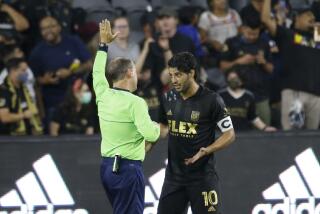NFL, Union Head for OT
- Share via
Pushed to the brink of a labor crisis, one that could redefine pro football’s competitive landscape, the NFL and its players’ union agreed Sunday to extend their negotiating deadline by three days.
The decision was announced less than an hour before the 9 p.m. PST start of free agency, when many NFL teams appeared poised to purge their roster of some high-salaried players to comply with the 2006 salary cap. The postponement came on the heels of an initial three-day extension, which went into effect Thursday.
The new deadline of 9 p.m. PST Wednesday allows team owners to meet Tuesday in Dallas to consider the latest offer by the union on a collective bargaining agreement.
In the hours leading to Sunday’s last-minute extension, the prospects for a solution looked bleak. After days of emotional undulations -- cycles of good news followed by bad -- the league and its players’ union broke off talks Sunday, unable to agree on how large a slice of the financial pie the players should receive in their next labor agreement.
“The talks ended after the NFL gave us a proposal which provided a percentage of revenues for the players which would be less than they received over the last 12 years,” said Gene Upshaw, executive director of the NFL Players Assn. “After suggesting we extend the waiver deadline from 6 o’clock [EST] to 10 this evening, they gave us a new proposal, which was worse than their prior offer. Quite naturally, we rejected that proposal and saw no need to continue meeting.”
Shortly thereafter came the latest 72-hour extension.
In the current labor deal, players receive their money primarily from national TV and ticket revenue. They are asking for 60% of all team revenue, including that received from the sale of luxury suites, club seats, stadium naming rights, and local TV and radio rights. The owners had been offering four percentage points less.
The NFL said that the union rejected a proposal that would have increased player compensation to “unprecedented levels,” and that the offer would have added a minimum of $1.5 billion in new dollars for players over the six-year life of the extension.
Although nothing as drastic as a player strike is on the horizon, a new set of rules will be in play if an agreement is not reached. And, once the deadline passes, the rules will remain in effect through February. The rules, by increasing the impact of each contract on the salary cap, make it more difficult to sign players to large contracts and therefore make it tougher to stockpile top talent.
The 2006 rules dramatically affect the amount of guaranteed money that will go into the contracts of high draft picks such as USC’s Matt Leinart and Reggie Bush. In fact, it potentially threatens a team’s ability to sign all of its picks.
“At this point, it’s really difficult to foresee contracts equaling the guaranteed money of 2005,” said agent Leigh Steinberg, who represents Leinart. “[The reason is] these rules were specifically designed to frighten teams and players away from allowing 2006 to arrive with no new CBA in place.”
A major reason for the negotiating breakdown is a disagreement between owners, not owners and players. The sticking point is the unwillingness of high-revenue teams to share the wealth with needier teams, and the ensuing rift has affected the negotiations with the players.
With no agreement, the 2006 salary cap will be $94.5 million. With a deal, however, that could go up by $10 million. The inability to reach an agreement left some teams scrambling Sunday night to get under the cap.
The expected flood of high-profile players into the free-agent market didn’t happen. Although there were a couple of eye-catching transactions -- Oakland quarterback Kerry Collins and New York Jet center Kevin Mawae were cut -- there were also last-minute contract extensions worked out for Jet quarterback Chad Pennington, Seattle running back Shaun Alexander, Green Bay running back Ahman Green and Tampa Bay linebacker Derrick Brooks.
More to Read
Go beyond the scoreboard
Get the latest on L.A.'s teams in the daily Sports Report newsletter.
You may occasionally receive promotional content from the Los Angeles Times.











